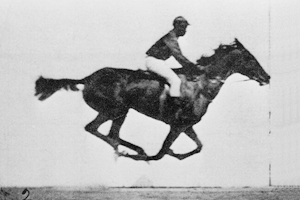Its not an exaggeration to claim that for at least many thousands of years or all recorded history, humans attempted to animate the real physical world to convey meaning to their stories.
Shadow puppets and automatons all being nice and fine, the great breakthrough in animation occurred a mere 150 years ago when first optical perspectives froze the subject absolutely and then merely played with the optics to create an illusion that the object moved. In other words as movement is incredibly cumbersome – just fake it instead.
Likewise movement in data is difficult to absolutely deal with. It is big difficult for big data and for Eureka which knows the data instead of simply storing it – that would be even that much more of a challenge. Fortunately, we can take a hint from the motion picture precursors. There are numerous ways to make believe that significant portions of the data are changing pretty quickly while fitting comfortably in the Eureka paradigm and practical application.
Big data having big momentum, logically cannot quickly change anyways without a exerting a big effort. At any given operation you may only change a very finite amount of data. With most data there is no change. Yesterdays news will not change. This mornings weather forecast has not changed (ok, well some things do). This weblog will not change, and since you started to read this paragraph you can rest pretty sure that many billions of opportunities have come and gone but the access log line remains as it was when the page first was requested. This document as I type changes plenty (too much in recursion I am afraid), but that is again a case of anthropomorphism of the small mind for even limited to me and what I have ever composed this is just a minute event that will bang be published and then not change again for a very very long number of clock cycles.
Clearly change is subservient to collection and organization of information in the first place, though you might think otherwise as so many systems are are designed with great concern for updating.


